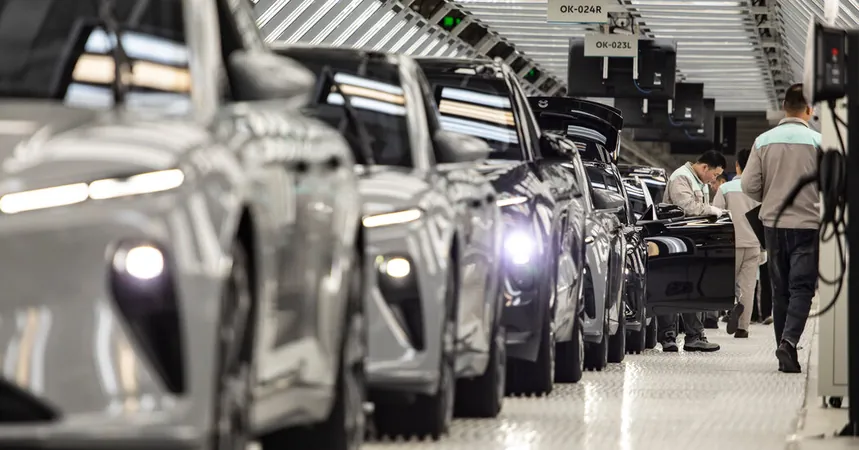
Biden Administration Moves to Ban Chinese Software in Vehicles: A Bold National Security Strategy
2024-09-23
Introduction
In a significant step toward securing American infrastructure, the Biden administration has unveiled a sweeping proposal to ban Chinese-developed software from internet-connected vehicles across the United States. Announced on Monday, this initiative aims to protect national security by preventing potential surveillance and cyber threats posed by foreign adversaries.
Rationale Behind the Ban
The underlying rationale for the proposed ban is to thwart Chinese intelligence from tracking the movements of Americans utilizing these vehicles and to safeguard critical infrastructure, such as the U.S. electric grid, from being compromised through automotive electronics. This decision marks what could be the last major restriction on Chinese products during President Biden’s current term, following previous moves that included the ban of Huawei telecommunications equipment and scrutiny over Chinese cranes operating at American ports.
Context and Legislative Efforts
This initiative coincides with ongoing Congressional efforts to sever ties between TikTok and its Chinese parent company, emphasizing the administration's commitment to addressing what it perceives to be significant cybersecurity vulnerabilities. Experts note that the U.S. is inching closer to establishing a 'digital iron curtain' with China—an alarming shift considering that just two decades ago, both nations were optimistic that the internet would foster deeper cooperation.
National Security Concerns
During an official briefing, Jake Sullivan, the national security adviser, argued that concerns regarding national security, rather than political motivations, drive the Commerce Department's decision to implement this ban. Sullivan highlighted the massive amount of data that connected vehicles can collect about drivers, as well as their ability to communicate with personal devices and U.S. critical infrastructure, thereby emphasizing the heightened risks if such technology originates from nations of concern like China.
Potential Exploitation of Vulnerabilities
U.S. officials are also worried about the potential impact of projects like 'Volt Typhoon,' which involves Chinese attempts to infiltrate American power and water systems. There’s a growing apprehension that in moments of geopolitical tension—such as a crisis surrounding Taiwan—these vulnerabilities could be exploited, drastically undermining U.S. military capabilities.
Political Consensus and Concerns
While looking ahead, the Biden administration may evaluate other industries for similar regulations, officials believe that none will have the extensive implications as those related to the automotive sector. Both Democrats and Republicans have found common ground in addressing perceived threats from China, although some analysts argue that this fear may be excessively exaggerated and could ironically harm American consumers.
Wider Implications and Future Restrictions
Richard Fontaine, CEO of the Center for a New American Security, articulated the administration's aim to construct a 'high fence around a small yard' of strategically significant technologies amid ongoing global tensions. He believes that the scope of restriction on Chinese tech is likely to expand, irrespective of the political landscape come election season.
Inclusion of Russian Software
Interestingly, the proposed rule would also extend to Russian software, albeit Russian automotive products are relatively minimal in the U.S. market. Experts like Brad Setser of the Council on Foreign Relations assert that the increasing militarization of technology and data collection is reshaping the security landscape, leading to the potential for broader restrictions in the future.
Scope of the Ban
Moreover, the proposed ban would impact all wheeled vehicles, which includes cars, trucks, and buses, exempting those designated for agricultural or mining purposes. The ban is set to commence across model year 2027, followed by hardware restrictions in 2030, reinforcing the administration's proactive measures to safeguard American citizens from foreign surveillance threats.
Official Statements
Gina Raimondo, the U.S. Secretary of Commerce, pointed out that while few Chinese or Russian-made vehicles are currently present on American roads, the initiative represents a crucial preventative strategy. It aims to protect Americans—particularly in terms of safeguarding personal data and preventing hostile actions, such as the possibility of foreign entities taking control or shutting down vehicles functioning within the U.S.
National Security Over Economic Concerns
She stressed, 'This is a strictly national security action and is not about trade or economic advantage.' This statement draws attention to the larger context of the Biden administration's approach, which has involved increasing tariffs on Chinese electric cars and tightening regulations surrounding Chinese technology firms, all aimed at bolstering domestic manufacturing of clean energy products.
Future of the Electric Vehicle Market
As the electric vehicle market continues to expand in the U.S., the implications of such a ban could have far-reaching consequences for consumers and the overall automotive landscape. Hundreds of billions of dollars are being allocated over the next decade towards incentives for electric vehicles, promising a revolutionary shift in both manufacturing and consumer habits that could redefine the transportation sector in the years to come.
Conclusion
In closing, the proposal is just a glimpse into a guarded future where U.S. technology policy actively combats perceived threats, establishing a precarious balance between national security and global economic interactions as tensions with China and Russia continue to escalate. The full extent of the impact remains to be seen, but one thing is clear: America is fortifying its defenses in an increasingly complex digital landscape.

 Brasil (PT)
Brasil (PT)
 Canada (EN)
Canada (EN)
 Chile (ES)
Chile (ES)
 España (ES)
España (ES)
 France (FR)
France (FR)
 Hong Kong (EN)
Hong Kong (EN)
 Italia (IT)
Italia (IT)
 日本 (JA)
日本 (JA)
 Magyarország (HU)
Magyarország (HU)
 Norge (NO)
Norge (NO)
 Polska (PL)
Polska (PL)
 Schweiz (DE)
Schweiz (DE)
 Singapore (EN)
Singapore (EN)
 Sverige (SV)
Sverige (SV)
 Suomi (FI)
Suomi (FI)
 Türkiye (TR)
Türkiye (TR)